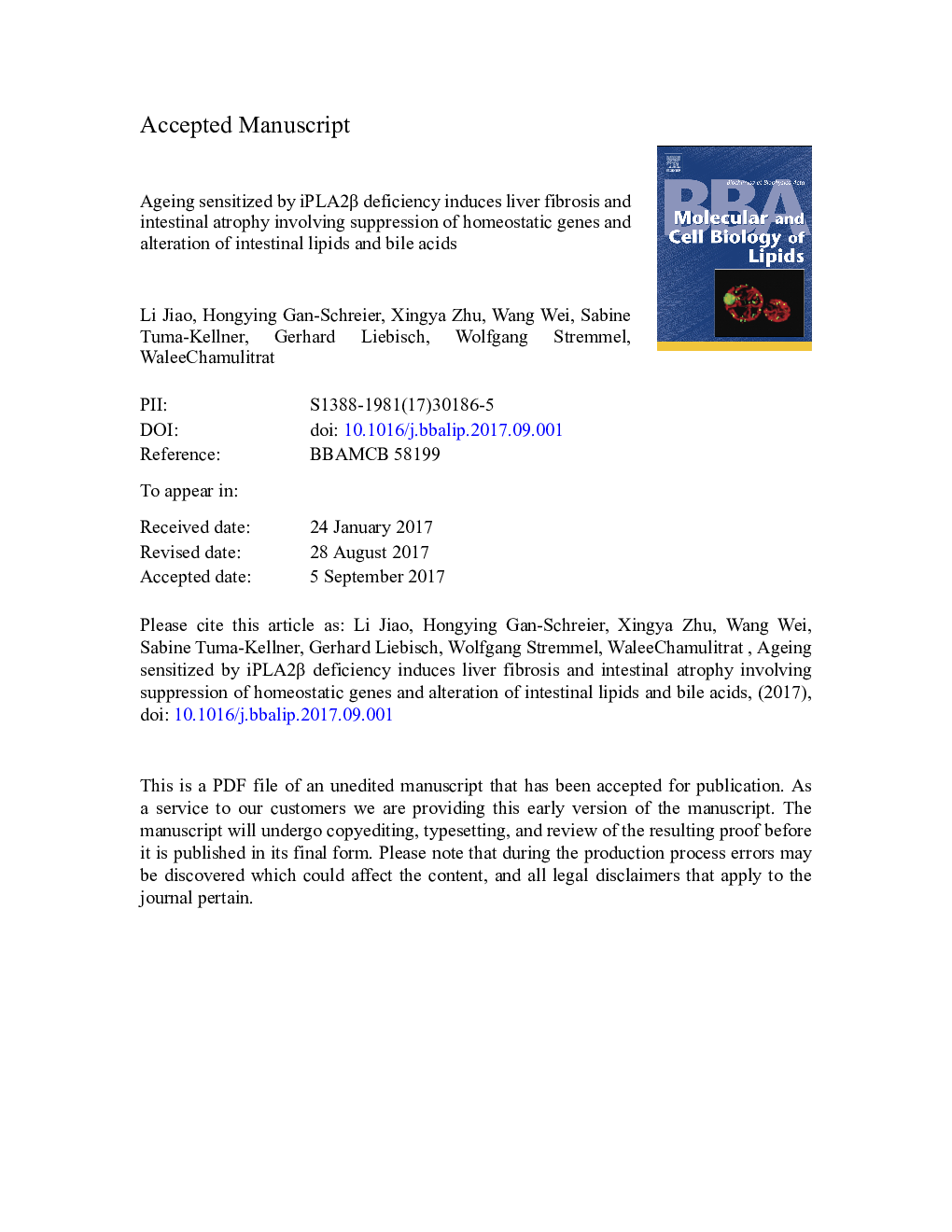| Article ID | Journal | Published Year | Pages | File Type |
|---|---|---|---|---|
| 5508331 | Biochimica et Biophysica Acta (BBA) - Molecular and Cell Biology of Lipids | 2017 | 41 Pages |
Abstract
Ageing is a major risk factor for various forms of liver and gastrointestinal (GI) disease and genetic background may contribute to the pathogenesis of these diseases. Group VIA phospholipase A2 or iPLA2β is a homeostatic PLA2 by playing a role in phospholipid metabolism and remodeling. Global iPLA2βâ/â mice exhibit aged-dependent phenotypes with body weight loss and abnormalities in the bone and brain. We have previously reported the abnormalities in these mutant mice showing susceptibility for chemical-induced liver injury and colitis. We hypothesize that iPLA2β deficiency may sensitize with ageing for an induction of GI injury. Male wild-type and iPLA2βâ/â mice at 4 and 20-22 months of age were studied. Aged, but not young, iPLA2βâ/â mice showed increased hepatic fibrosis and biliary ductular expansion as well as severe intestinal atrophy associated with increased apoptosis, pro-inflammation, disrupted tight junction, and reduced number of mucin-containing globlet cells. This damage was associated with decreased expression of intestinal endoplasmic stress XBP1 and its regulator HNF1α, FATP4, ACSL5, bile-acid transport genes as well as nuclear receptors LXRα and FXR. By LC/MS-MS profiling, iPLA2β deficiency in aged mice caused an increase of intestinal arachidonate-containing phospholipids concomitant with a decrease in ceramides. By the suppression of intestinal FXR/FGF-15 signaling, hepatic bile-acid synthesis gene expression was increased leading to an elevation of secondary and hydrophobic bile acids in liver, bile, and intestine. In conclusions, ageing sensitized by iPLA2β deficiency caused a decline of key intestinal homeostatic genes resulting in the development of GI disease in a gut-to-liver manner.
Keywords
DCAα-SMAACCTNFαCHOLMCALPSCCRFASBcl-2MUFALPCLPElysophosphatidylethanolamineUPRXBP1ATF6Bcl-xLCCLCDCAHNF1αFXRNEFAZO-1Q-RT-PCRUDCALXRConACK19LPCATSREBP-1CEPTACSLSCD-1PLA2G6bcl-2-like protein 4CCTαFATP4elF2αFarnesoid X-activated receptorLiquid-chromatography mass spectrometryVCAM1Long-chain acyl-CoA synthetaseAB-PASiPLA2βtumor necrosis factorαBiPH&EIRE1αLC-MS/MSROSinositol-requiring enzyme 1αethanolamine kinaseLCAStearoyl-CoA desaturase 1acetyl-CoA carboxylasesphingomyelinChenodeoxycholic acidDeoxycholic aciddocosahexaenoic acidLithocholic acidmuricholic acidPolyunsaturated fatty acidsfatty acid synthasePUFACholic acidnon-esterified fatty acidsmonounsaturated fatty acidsUrsodeoxycholic acidα-smooth muscle actinImmunohistochemistryIHCBaxBADTriglyceridesCHOPDHAAgeingIntestinal epithelial cellscytokeratin 19endoplasmic reticulumeukaryotic translation initiation factor 2αfibroblast growth factor 15phosphatidylinositolphosphatidylcholinephosphatidylethanolaminePhosphatidylserineB-cell lymphoma 2Lysophosphatidylcholinelysophosphatidylcholine acyltransferaseLipopolysaccharidesLipidomicsChemokine ligandBcl-2-associated death promoterZonula occludens-1wild-typehematoxylin-eosinIntestinal homeostasisquantitative real-time polymerase chain reactionUnfolded protein responseSterol regulatory element-binding protein-1Binding immunoglobulin Proteinfatty acid transport protein 4CCAAT-enhancer-binding protein homologous proteinprotein kinase RNA-like ER kinasePERKliver X receptorcholesterolIECcholine kinaseReactive oxygen specieschemokine receptor
Related Topics
Life Sciences
Biochemistry, Genetics and Molecular Biology
Biochemistry
Authors
Li Jiao, Hongying Gan-Schreier, Xingya Zhu, Wang Wei, Sabine Tuma-Kellner, Gerhard Liebisch, Wolfgang Stremmel, Walee Chamulitrat,
